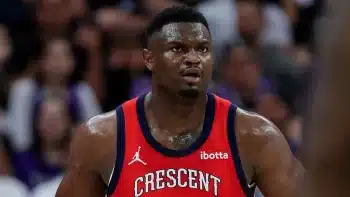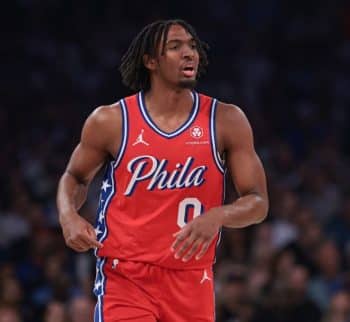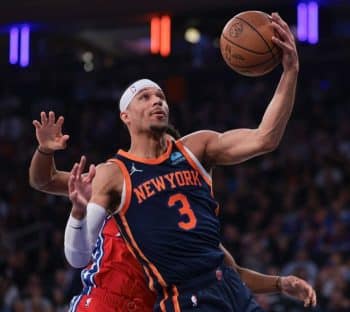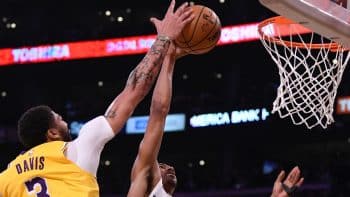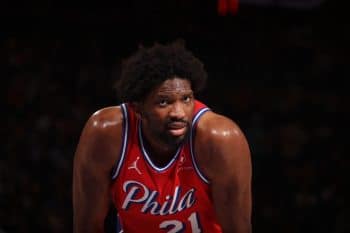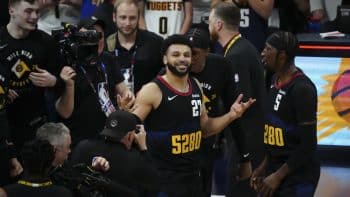NBA
NBA Sunday: Chris Paul’s Quiet Motivation

Everything matters—every step, every turnover, every play and every point.
Chris Paul has known this since the beginning. And on this day, he treated a fateful possession in Game 4 of the 2016 playoffs in Portland in much the same manner. The attitude and motivation are what enabled a routine, meaningless play to have a tremendous impact on the way his career’s narrative, if it all ended now, would be written.
With a packed house of opposing fans, Paul sprinted up the floor, ball in hand. He took a dribble with his right hand, but feeling an unfamiliar pain, alternated dribbles with his left until—as usual—he found J.J. Redick for an in-stride jumper.
Just a few moments prior, with about seven minutes remaining in the second quarter of a six-point game, Paul refused to give up on Gerald Henderson’s drive to the basket. As Henderson slowed for his two-step and gather, Paul—en route to successfully stripping the ball—suffered a broken third metacarpal in his right hand.
For the Clippers, their season ended right then and there.
But of course, a new one has begun. And for Paul and his Los Angeles Clippers, their collective pursuit of greatness, glory and, yes, sweet redemption, continues.
* * * * * *
In the same manner that the cat can be skinned in more than one way, different people can view the exact same scenario and come away with different interpretations.
For a great many, the Clippers are nothing more than a band of losers, led by Paul.
In most arguments, as attorneys are trained to do, certain facts—the ones that help one’s case—are highlighted. Those that don’t are ignored.
Case in point: Paul has never played in a conference finals and has zero championship rings to show for what has been one of the most impressive point guard careers we have ever seen. He was the leader of a Clippers team that was desperate to prove its mettle but—in squandering a 3-1 series lead to the Houston Rockets in the 2015 playoffs—failed embarrassingly, in flaming and dramatic fashion.
Up 3-1, at home, the Clippers famously led James Harden and his Rockets by 19 points late in the third quarter of a close-out Game 5. Yet somehow, for the next 13 quarters of that series, the Rockets badly outplayed team CP3 and pulled off a miraculous upset.
While it is true that Paul has had a few playoff moments wherein he has fallen short, most superstar players have. Nobody—not Kobe Bryant, not Tim Duncan and not LeBron James—has an unblemished record in that regard. The most that the contemporary superstar can hope for is an opportunity to write over the shortcoming.
After being obliterated by the Celtics in the 2008 NBA Finals, what would Bryant’s legacy have been had Ron Artest not nailed the biggest three-pointer of his life to help the Lakers defeat the Celtics in 2010?
Similarly, what would LeBron James’ legacy have been had Ray Allen not hit the biggest three-pointer of his life in the waning moments of Game 6 in 2013?
What would his legacy have been had Draymond Green not lost his cool? Or if Stephen Curry, Andre Iguodala and Andrew Bogut all had been 100 percent healthy?
Of course, these questions are all rhetorical. There may be thousands of permutations and “what if” questions that can be asked, but only one reality. And the reality is this: to whom much is given, much is required.
Of Paul, we required exactly what we required of James and, before him, Bryant. Like Paul, they each had their fair amount of shortcomings but in each instance, they were able to exorcise the demons that haunted them and their legacies.
At this point, that’s what Paul is playing for.
* * * * * *
DeAndre Jordan learned that although Christmas only comes once per year, sometimes, it does come early. In December 2011, with Blake Griffin and Caron Butler by his side, he learned that the Clippers had acquired Chris Paul from New Orleans.
The duo was so ecstatic, that it took quite a few moments for Jordan to even realize that at least a few of his former teammates would be given up in the deal. Griffin, excited to have Paul joining the club, famously declared the Clippers to be “Lob City.”
Since then, everything has been different. To Paul, much had been given. Accordingly, much has been required. So with the Clippers on his back and with a bevy of basketball talents at his disposal, the critics and the basketball-watching public only cared about what Paul’s acquisition will yield.
Almost isn’t good enough. That’s why, despite winning 56 games with the 2007-08 Pelicans and putting the Spurs on the ropes by taking a 3-2 series lead in the second-round battle, nary a soul remembers that year for Paul. The public only recalls that Paul failed to win the Most Valuable Player Award that went to Kobe Bryant and that his team couldn’t ultimately put the Spurs away.
The critics won’t rightfully criticize Blake Griffin for not watching old tape of the likes of Larry Johnson and Charles Barkley and learning how to effectively use a pivot foot, balance, patience and his hips to create easy, back-to-the-basket scoring opportunities in the paint. They also won’t acknowledge what most people know to be true—that the Clippers would be nothing more than a marginal playoff team without the dynamic point guard. They also won’t acknowledge that he has almost single-handedly transformed two franchises from being mere afterthoughts in the NBA’s hierarchy to ones that had legitimate expectations and hopes for competing for championships.
No, Paul may not be a championship-winner, but he certainly is a contender-maker, and not many NBA players can say that for themselves.
Unfortunately, in our winner-take-all sports culture, we have been taught to undervalue and downplay that.
* * * * * *
With sweaty palms and a racing heart, Kawhi Leonard stepped to the free-throw. Merely 19 seconds away from cradling the Larry O’Brien trophy, here in Miami, Leonard saw his basketball life flash before his very eyes. A two-point lead separated his Spurs from LeBron James and Dwyane Wade. In all likelihood, had Leonard hit his two free-throws, the game and championship would have been clinched.
The normally unflappable Leonard stepped to the line and with a deep sigh and a glossy eyed gaze, missed the first of his two free-throws. Although he made the second, that missed point was the difference between Ray Allen’s fateful three-pointer tying the game or Miami still trailing by a point.
The rest, again, is history.
To a man, the ensuing season, the Spurs admitted that their summers were long. Leonard himself admitted that the missed free-throw kept him up at night while Danny Green said that he still thinks about that Game 6.
Only today, nobody talks about it. Nobody talks about Leonard’s failure just like nobody talks about Kobe quitting on the Lakers in his infamous Game 7 performance against the Phoenix Suns back in 2006 or LeBron laying an egg the size of Dan Gilbert’s wallet in Game 5 against the Boston Celtics back in 2010.
Nobody talks about the shortcomings of those Spurs just like nobody talks about the 12 years that Kevin Garnett spent in Minnesota. His Timberwolves were eliminated in the first round seven consecutive years and managed to advance to the conference finals only once.
Finally, after 13 years, in Boston, Garnett was able to win it all. Along the way, just like Paul, he faced a tremendous amount of criticism. There were many that wondered whether he was truly great, as the farce that the public is routinely sold is that great players, somehow, single-handedly, can “will” their teams to victory.
Nobody talks about the failures because history is written by the victor, and a few moments of glorious triumph can wipe away a lifetime of futile shortcomings. Just ask the Chicago Cubs.
From Kevin Garnett to Kobe Bryant and from LeBron James to Kawhi Leonard, we routinely see great players rewriting the obituaries of their shortcomings.
Titles can help erase the painful memories. Or, at the very least, make them more bearable.
So if you look around at Chris Paul and the Los Angeles Clippers and wonder what’s been motivating them, look no further than that. The wise man knows that tomorrow will bring forth another opportunity. But the wisest man knows something far greater—sometimes, in life, one victory can erase all of the painful memories of failures past.
When Paul walked off the court at Portland’s Moda Center, he was visibly shaken. His eyes welling with water, he took the long, slow, painful walk to the locker room. With a broken spirit and heavy heart, he carried his team’s championship aspirations with him.
Collectively, as the Clippers have begun the season looking like the best team in the Western Conference, with their pain and tremendous shortcoming as their pen, they are attempting to rewrite their narrative.
And if what has transpired over the course of the team’s first weeks of the young season are indicative of what is to transpire in the future, for Doc Rivers, Blake Griffin and Chris Paul, their story may be far from over.
